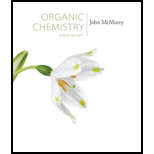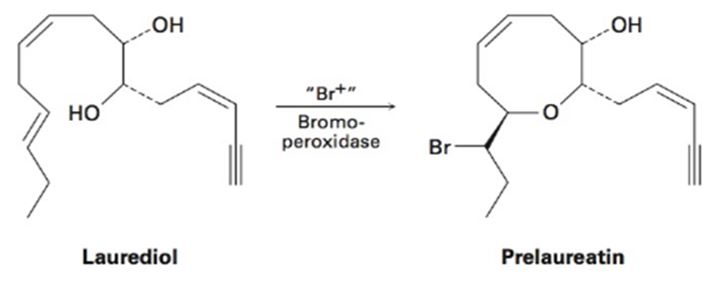
Organic Chemistry
9th Edition
ISBN: 9781305080485
Author: John E. McMurry
Publisher: Cengage Learning
expand_more
expand_more
format_list_bulleted
Concept explainers
Textbook Question
Chapter 8.SE, Problem 36MP
Isolated from marine algae, prelaureatin is thought to be biosynthesized from laurediol by the following route. Propose a mechanism.

Expert Solution & Answer
Trending nowThis is a popular solution!

Students have asked these similar questions
The mechanism for acidic hydrolysis of a nitrile resembles the basic hydrolysis, exceptthat the nitrile is first protonated, activating it toward attack by a weak nucleophile (water).Under acidic conditions, the proton transfer (tautomerism) involves protonation on nitrogen followed by deprotonation on oxygen. Propose a mechanism for the acid-catalyzedhydrolysis of benzonitrile to benzamide.
Propose a synthesis of the anti-inflammatory drug Fenclorac from phenylcyclohexane.
Show how to synthesize the following amines from the indicated starting materials byreductive amination. cyclohexylamine from cyclohexanone
Chapter 8 Solutions
Organic Chemistry
Ch. 8.1 - Prob. 1PCh. 8.1 - How many alkene products, including E,Z isomers,...Ch. 8.2 - Prob. 3PCh. 8.2 - Addition of HCl to 1, 2-dimethylcyclohexene yields...Ch. 8.3 - Prob. 5PCh. 8.3 - Prob. 6PCh. 8.4 - Prob. 7PCh. 8.4 - From what alkenes might the following alcohols...Ch. 8.5 - Prob. 9PCh. 8.5 - What alkenes might be used to prepare the...
Ch. 8.5 - Tho following cycloalkene gives a mixture of two...Ch. 8.6 - Prob. 12PCh. 8.7 - Prob. 13PCh. 8.7 - Starting with an alkene, how would you prepare...Ch. 8.8 - Prob. 15PCh. 8.8 - Prob. 16PCh. 8.9 - What products would you expect from the following...Ch. 8.10 - Prob. 18PCh. 8.10 - Prob. 19PCh. 8.13 - Prob. 20PCh. 8.13 - What products are formed from hydration of...Ch. 8.SE - Name the following alkenes, and predict the...Ch. 8.SE - Prob. 23VCCh. 8.SE - Prob. 24VCCh. 8.SE - Prob. 25VCCh. 8.SE - Prob. 26MPCh. 8.SE - Prob. 27MPCh. 8.SE - Draw the structures of the organoboranes formed...Ch. 8.SE - Prob. 29MPCh. 8.SE - Provide the mechanism and products for the...Ch. 8.SE - Propose a curved-arrow mechanism to show how ozone...Ch. 8.SE - Prob. 32MPCh. 8.SE - Prob. 33MPCh. 8.SE - Prob. 34MPCh. 8.SE - 10-Bromo- α -chamigrene, a compound isolated from...Ch. 8.SE - Isolated from marine algae, prelaureatin is...Ch. 8.SE - Dichlorocarbene can be generated by heating sodium...Ch. 8.SE - Reaction of cyclohexene with mercury(II) acetate...Ch. 8.SE - Use your general knowledge of alkene chemistry to...Ch. 8.SE - Prob. 40MPCh. 8.SE - Hydroboration of 2-methyl-2-pentene at 25°C,...Ch. 8.SE - Prob. 42APCh. 8.SE - Suggest structures for alkenes that give the...Ch. 8.SE - Prob. 44APCh. 8.SE - Prob. 45APCh. 8.SE - Prob. 46APCh. 8.SE - Prob. 47APCh. 8.SE - Predict the products of the following reactions....Ch. 8.SE - Prob. 49APCh. 8.SE - How would you carry out the following...Ch. 8.SE - Draw the structure of an alkene that yields only...Ch. 8.SE - Show the structures of alkenes that give the...Ch. 8.SE - Prob. 53APCh. 8.SE - Which of the following alcohols could not be made...Ch. 8.SE - Prob. 55APCh. 8.SE - Prob. 56APCh. 8.SE - Prob. 57APCh. 8.SE - Compound A has the formula C10HI6. On catalytic...Ch. 8.SE - Prob. 59APCh. 8.SE - Prob. 60APCh. 8.SE - Prob. 61APCh. 8.SE - Draw the structure of a hydrocarbon that absorbs 2...Ch. 8.SE - Prob. 63APCh. 8.SE - The sex attractant of the common housefly is a...Ch. 8.SE - Prob. 65APCh. 8.SE - Prob. 66APCh. 8.SE - α-Terpinene, C10H16, is a pleasant-smelling...Ch. 8.SE - Prob. 68APCh. 8.SE - Prob. 69APCh. 8.SE - Prob. 70APCh. 8.SE - Prob. 71APCh. 8.SE - Prob. 72AP
Knowledge Booster
Learn more about
Need a deep-dive on the concept behind this application? Look no further. Learn more about this topic, chemistry and related others by exploring similar questions and additional content below.Similar questions
- Aldehydes and ketones react with thiols to yield thioacetals just as they react with alcohols to yield acetals. Predict the product of the following reaction, and propose a mechanism:arrow_forwardNaturally occurring compounds called cyanogenic glycosides, such as lotaustralin, release hydrogen cyanide, HCN, when treated with aqueous acid. The reaction occurs by hydrolysis of the acetal linkage to form a cyanohydrin, which then expels HCN and gives a carbonyl compound. (a) Show the mechanism of the acetal hydrolysis and the structure of the cyanohydrin that results. (b) Propose a mechanism for the loss of HCN, and show the structure of the carbonyl compound that forms.arrow_forwardFollowing is a synthesis for toremifene, a nonsteroidal estrogen antagonist whose structure is closely related to that of tamoxifen. (a) This synthesis makes use of two blocking groups, the benzyl (Bn) group and the tetrahydropyranyl (THP) group. Draw a structural formula of each group and describe the experimental conditions under which it is attached and removed. (b) Discuss the chemical logic behind the use of each blocking group in this synthesis. (c) Propose a mechanism for the conversion of D to E. (d) Propose a mechanism for the conversion of F to toremifene. (e) Is toremifene chiral? If so, which of the possible stereoisomers are formed in this synthesis?arrow_forward
- One step in the urea cycle for ridding the body of ammonia is the conversion of argininosuccinate to the amino acid arginine plus fumarate. Propose a mechanism for the reaction, and show the structure of arginine.arrow_forwardWhen cyclohexanone is heated in the presence of a large amount of acetone cyanohydrin and a small amount of base, cyclohexanone cyanohydrin and acetone are formed. Propose a mechanism.arrow_forwardPropose a mechanism for the reaction of benzyl acetate with methylamine. Label theattacking nucleophile and the leaving group, and draw the transition state in which theleaving group leaves.arrow_forward
- A variation of the acetamidomalonate synthesis can be used to synthesize threonine. The process involves the following steps: Ethoxide ion deprotonates diethyl acetamidomalonate, forming enolate anion 1; Enolate anion 1 makes a nucleophilic attack on acetaldehyde, forming tetrahedral intermediate 2; Protonation of the oxyanion forms alcohol 3; Acid hydrolysis yields dicarboxyamino alcohol 4; Decarboxylation leads to the final amino acid. Write out the mechanism on a separate sheet of paper, and then draw the structure of enolate anion 1.arrow_forwardIn the presence of an acid catalyst, acetaldehyde forms a trimer known as paraldehyde. Because it induces sleep when it is administered to animals inlarge doses, paraldehyde is used as a sedative or hypnotic. Propose a mechanism for the formation of paraldehyde.arrow_forwardWhen a student treated butanedioic acid with thionyl chloride, she was surprised to find that the product she obtained was an anhydride rather than an acyl chloride. Propose a mechanism to explain why she obtained an anhydride.arrow_forward
- Draw a mechanism to show how 4-ethylimidazole tautomerises to 5-ethylimidazole under acidic conditions. What would happen to 4-ethylpyrazole under the same conditions?arrow_forwardIsoamyl acetate (also known as isopentyl acetate) is an ester that is referred to as “banana flavor” due to its odor that resembles that of banana. It can be synthesized from isopentyl alcohol and acetic acid via nucleophilic acyl substitution mechanism. Propose a mechanism for the synthesis of isoamyl acetate from acetic acid and isoamyl alcohol.arrow_forwardPropose a synthesis for the following transformation. OEt HO,arrow_forward
arrow_back_ios
SEE MORE QUESTIONS
arrow_forward_ios
Recommended textbooks for you

 Organic ChemistryChemistryISBN:9781305580350Author:William H. Brown, Brent L. Iverson, Eric Anslyn, Christopher S. FootePublisher:Cengage Learning
Organic ChemistryChemistryISBN:9781305580350Author:William H. Brown, Brent L. Iverson, Eric Anslyn, Christopher S. FootePublisher:Cengage Learning


Organic Chemistry
Chemistry
ISBN:9781305580350
Author:William H. Brown, Brent L. Iverson, Eric Anslyn, Christopher S. Foote
Publisher:Cengage Learning
Enzymes - Effect of cofactors on enzyme; Author: Tutorials Point (India) Ltd;https://www.youtube.com/watch?v=AkAbIwxyUs4;License: Standard YouTube License, CC-BY
Enzyme Catalysis Part-I; Author: NPTEL-NOC IITM;https://www.youtube.com/watch?v=aZE740JWZuQ;License: Standard Youtube License